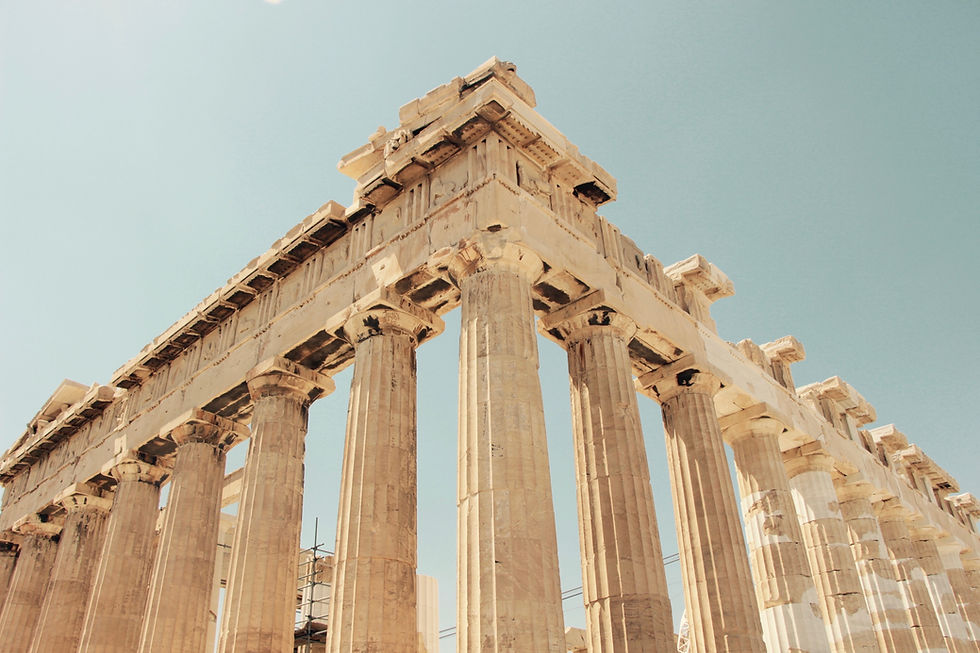Arcadia - Greek Lands of Ancient Gods
- Sylvia Rose

- Jan 5, 2024
- 4 min read
Updated: May 20, 2024
Arcadia is a central pastoral region on the Peloponnese peninsula of southern Greece. It's equated with idyllic Arcadia, a paradise of peace and prosperity, romanticized during the Renaissance. Its name comes from the mythical figure Arcas.
See also:

Arcas is a hunter who becomes King of Arcadia. He teaches the people agriculture, weaving and baking bread. The Arcadians are already working the fertile lands when the people known as Mycenaeans arrive from the lands to the west.
Read: Cult of the Fire God - Bronze Age Quest Adventure
The mountainous countryside with lush green valleys and grassland is home to Hermes, herald of the gods, and Pan, the rustic goat-god. Arcadia venerates other deities, such as Artemis and Athena.
See also:

They're adopted in various versions by the coastal Mycenaean cultures into enduring Greek myth. Demeter, Persephone and Poseidon also originate in Arcadia.
Read: Cult of the Fire God - Bronze Age Quest Adventure
Considered a god of Thracian origin, Dionysos (Dionysus) is found in the ancient Arcadian pantheon. From Arcadia also come the Erinyes, later incorporated into general Greek myth as the Furies.
See also:

In the ancient world the Arcadians are among the oldest tribes of Greece. They're considered descended from an older culture, the Pelasgians, indigenous to the area. Pelasgians is also a blanket term for those living in Greece before the arrival of the Greeks.
The Arcadians establish several towns and settlements. They form a loose aggregation of clan and tribal groups. Because Arcadia is entirely inland, it doesn't have a navy. For the Trojan war, King Agamemnon supplies the Arcadian contingent with sailing vessels.
See also:

In Arcadia, the cities Mantinea, Tegea and Orchomenos control the fertile valleys. About two dozen smaller towns are established in the mountains and plains, gradually increasing in number over time. The Peloponnese peninsula has a unique structure of valleys, gorges, cliffs and crags created by violent seismic activity.
Despoina, along with Demeter, is the primary deity worshipped in Arcadia. The cult of Despoina is especially popular at a sanctuary in Lycosura, south Arcadia.
See also:

Despoina is the half-horse daughter of Demeter. Poseidon, chthonic god of groundwater and horses, pursues Demeter as a horse. She changes to a mare, and they beget the divine horse Arion and his sister Despoina.
Read: Cult of the Fire God - Bronze Age Quest Adventure
She can appear as a mare, human woman or a woman with horse's head. The Titan Antyos, who raises Despoina, is another important figure of Arcadian myth. Despoina's real name is known only to those initiated into the Mysteries of her cult. She's called 'the mistress' or 'the lady'.
See also:

In 370 BCE the Arcadian League forms, a group of city states united under the name. Arcadians battle Spartans and Mycenaeans successfully for a number of years. Finally Mycenae prevails. Shortly thereafter Arcadia joins the Achaean League in the north.
Another, later myth of Arcadia involves the Arcadian King, Lycaon, who has fifty sons. Zeus pays him a visit. Lycaon murders his youngest son, Nyctimus, cooks him up and serves him to Zeus. Lycaon wants to know if the 'all-knowing' Zeus can recognize human flesh.
See also:

He can, and he's appalled. Zeus turns Lycaon into a wolf, murders the other 49 sons and restores Nyctimus to life. Lycaon has three daughters as well - Callisto, Dia and Psophis. Callisto, a member of the cult of Artemis, is a love interest of Zeus.
Zeus disguises himself as Artemis and deceives Callisto into sleeping with him. She gets pregnant and is thrown out of the cult. Either Hera or Artemis turns her in a bear. As Callisto is about to be killed by her son hunting, Zeus puts her in the sky as constellation Ursa Major. She's considered the "bear-mother" of the Arcadians.
See also:

With the romantic inclinations of the the European Renaissance, Arcadia is portrayed as a land of simplicity, peace and plenty. For a while, its name is synonymous with Paradise.
See also:


